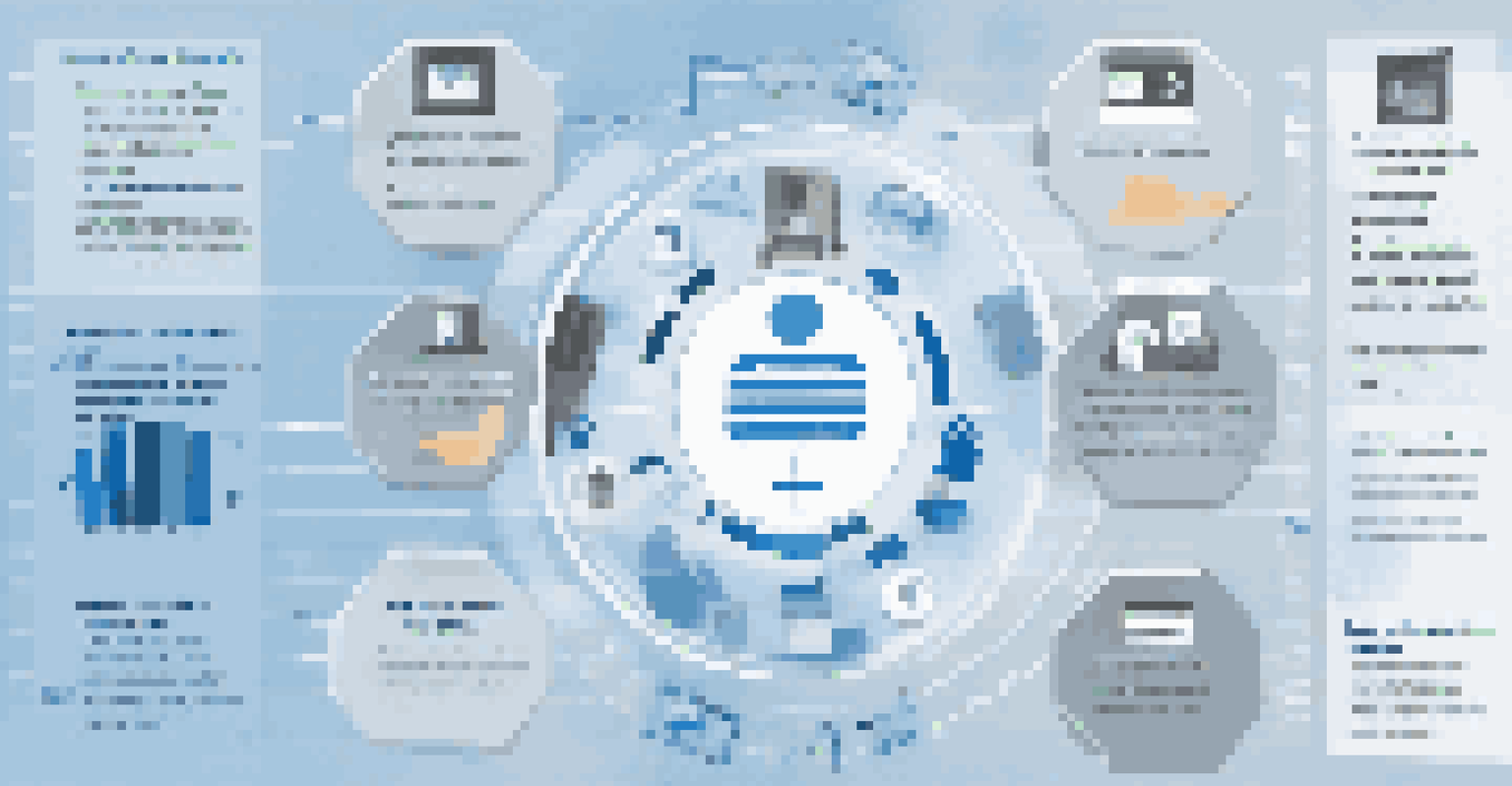Data Integrity and Privacy: Navigating Cloud Compliance

Understanding Data Integrity in the Cloud Environment
Data integrity refers to the accuracy and consistency of data over its lifecycle. In the cloud, this means ensuring that data remains unaltered during storage and transmission. With so many users accessing information, maintaining data integrity can be challenging, as even minor discrepancies can lead to significant issues.
Data is a precious thing and will last longer than the systems themselves.
For example, consider a healthcare provider using a cloud-based system to manage patient records. If data integrity is compromised, it could result in incorrect medical decisions, potentially endangering patients’ lives. Therefore, implementing robust validation processes is crucial to safeguard data integrity in cloud environments.
Moreover, regular audits and checks can help identify any discrepancies early on. By fostering a culture of accountability and transparency, organizations can ensure that data integrity remains a top priority as they navigate the complexities of cloud compliance.
The Importance of Data Privacy in Cloud Computing
Data privacy ensures that sensitive information is only accessible to authorized individuals. In the context of cloud computing, where data is stored off-site, maintaining privacy is paramount. Breaches can lead to severe consequences, including financial losses and reputational damage.

Take social media platforms, for instance; they handle vast amounts of user data daily. If this information is mishandled or leaked, users could face identity theft or harassment. Therefore, companies must implement strict privacy policies that comply with regulations like GDPR and CCPA to protect user data.
Data Integrity is Crucial in Cloud
Ensuring data accuracy and consistency in the cloud is vital to prevent serious consequences, such as incorrect medical decisions in healthcare.
Consequently, organizations should invest in encryption and access controls to bolster data privacy. By prioritizing user trust and fostering a secure digital environment, businesses can thrive while navigating the challenges of cloud compliance.
Navigating Cloud Compliance Regulations Effectively
Cloud compliance involves adhering to various regulations governing data protection and privacy. These regulations can vary by industry and region, making it essential for organizations to stay informed about their obligations. Failure to comply can lead to hefty fines and legal repercussions.
The biggest risk is not taking any risk. In a world that is changing really quickly, the only strategy that is guaranteed to fail is not taking risks.
For instance, financial institutions often face stricter regulations due to the sensitive nature of their data. They must ensure compliance with laws like the PCI DSS (Payment Card Industry Data Security Standard) to protect customers' financial information. Understanding these requirements can be overwhelming, but they are crucial for ensuring legal and ethical operations.
To navigate these complexities, organizations should seek guidance from compliance experts and invest in compliance management tools. By staying proactive and informed, companies can reduce the risk of non-compliance while maintaining a strong reputation.
Best Practices for Ensuring Data Integrity and Privacy
Implementing best practices is vital for ensuring data integrity and privacy in the cloud. Regularly updating security protocols, conducting employee training, and utilizing strong encryption methods are just a few ways to bolster defenses. These proactive measures help create a secure environment where data can thrive.
Consider a company that provides online services; they must regularly back up their data and monitor user access to prevent unauthorized breaches. Establishing a clear policy on data handling can also empower employees to take ownership of their roles in maintaining data security.
Prioritize Data Privacy Measures
Implementing strict privacy policies and robust security measures is essential to protect sensitive information and maintain user trust in cloud computing.
Furthermore, organizations should conduct periodic audits to assess their compliance with established practices. By continuously evaluating their strategies, they can adapt to new threats and ensure that data integrity and privacy remain uncompromised.
The Role of Technology in Enhancing Data Security
Technology plays a pivotal role in enhancing data security within cloud environments. Tools such as firewalls, intrusion detection systems, and automated compliance solutions can significantly reduce vulnerabilities. By leveraging these technologies, organizations can create robust defenses against potential threats.
For example, artificial intelligence (AI) can analyze user behavior and detect anomalies, alerting administrators to potential breaches. This proactive approach allows companies to respond quickly to security incidents, minimizing damage and ensuring data integrity.
Additionally, adopting a multi-cloud strategy can further enhance security. By distributing data across various platforms, organizations can mitigate risks associated with a single point of failure, thereby improving overall data security and compliance.
Building a Culture of Data Responsibility in the Workplace
Creating a culture of data responsibility within an organization is essential for maintaining data integrity and privacy. Employees should feel empowered to take ownership of data security and understand their role in protecting sensitive information. This cultural shift starts at the top, with leadership setting the tone for data management practices.
For instance, conducting regular training sessions can equip employees with the knowledge they need to safeguard data effectively. Encouraging open discussions about data security can also foster a sense of shared responsibility, making everyone feel accountable for data integrity.
Embrace Compliance Best Practices
Staying informed about regulations and investing in compliance management tools can help organizations avoid legal repercussions and enhance their reputation.
Moreover, recognizing and rewarding employees who contribute to data protection efforts can reinforce this culture. By prioritizing data responsibility, organizations can ensure that data integrity and privacy are ingrained in their operations.
Future Trends in Cloud Compliance and Data Management
As technology evolves, so do the challenges and opportunities surrounding cloud compliance and data management. Emerging trends such as artificial intelligence, machine learning, and blockchain are poised to revolutionize how organizations handle data integrity and privacy. Staying ahead of these trends is crucial for maintaining compliance in an ever-changing landscape.
For example, blockchain technology can provide a transparent and tamper-proof method for recording transactions, enhancing data integrity. Similarly, AI-driven analytics can help organizations predict potential compliance risks, allowing them to address issues before they escalate.

As we look to the future, organizations must remain agile and adaptable in their approaches to data management. By embracing innovative technologies and proactive strategies, they can navigate the complexities of cloud compliance and ensure data integrity and privacy for years to come.